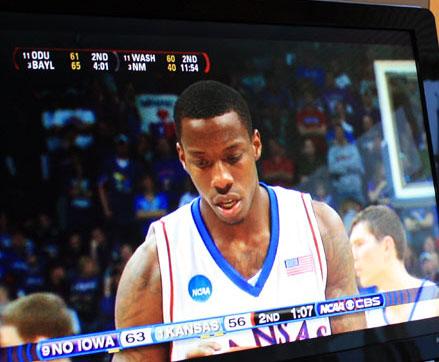The corruption of American college sports
NCAA 2010 March Madness on TV. (Photo by Flickr user The D34n)
Story from Here and Now. Listen to audio for full report.
Every season seems to bring more scandals involving college sports, but a provocative article in The Atlantic says the real scandal is the NCAA’s concept of amateurism, and the story makes a case for paying college athletes. In the piece, historian Taylor Branch argues for paying athletes and also says a spate of lawsuits making their way through the courts could destroy the NCAA.
Branch believes the structure of college sports — where student athletes generate billions for universities, yet earn nothing for themselves — is at the core of the problem. He wrote:
…corporations offer money so they can profit from the glory of college athletes, and the universities grab it. In 2010, despite the faltering economy, a single college athletic league, the football-crazed Southeastern Conference (SEC), became the first to crack the billion-dollar barrier in athletic receipts. The Big Ten pursued closely at $905 million. That money comes from a combination of ticket sales, concession sales, merchandise, licensing fees, and other sources — but the great bulk of it comes from television contracts.
The numbers are “gigantic” Branch told Here and Now: “Every year, just for March Madness — the one-month tournament — CBS-Turner pays the NCAA $771 million dollars, which is 95 percent of the NCAA’s income that they have to spread to all their thousand-member colleges.”
“The average coach’s salary now, in top-ranked sports, is over $2 million dollars in football,” Branch adds. “We now have assistant coaches getting paid more than $1 million dollars a year, plus benefits.”
The problem Branch has with the system is this: the people who are providing the labor and skills — the student athletes — are not being paid. “They can’t even sell their own jerseys to raise money for spring break,” Branch said. “AJ Green did it last year at the University of Georgia. First round draft choice — was suspended for four games for selling his own jersey, while at the same time the University of Georgia was selling his jersey at the college athletic store.”
Branch says he came to his story wanting to believe in the academic ideal of college sports, “but the more I looked into it, the more I realized that there are some fundamental injustices here.”
—————————————————-
“Here and Now” is an essential midday news magazine for those who want the latest news and expanded conversation on today’s hot-button topics.
